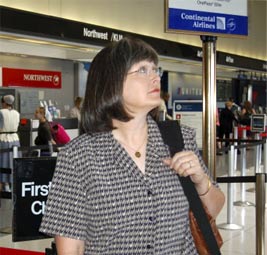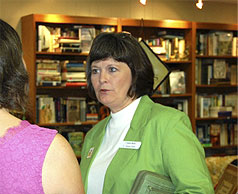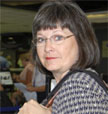wrote The Shy Writer to take a stand. As the book states, “Sell your words, not your soul.” Conferences mean hordes of people, an intimidating thought to many writers, but you can develop tricks and mindsets to carry you through such an event.
Writing takes an exceptional ability to withdraw into one’s self for long periods of time. Writers reach internally deep to tap not only words, but also dialog, emotion, and brand new worlds. Then, after days, weeks, or months of introspection and magical creation, that same writer is expected to stand before a crowd and sell, walk into a bookstore and present, attend a conference and network, approach an agent and pitch. Nothing pains a shy writer more than to step in front of the world and talk about those intimate moments spent behind closed doors.
Shyness appears mysterious because people can not read it. The public is unable to break down the wall to know the internal person, so those people paint a picture of the shy person any way they choose. The self-enveloped person sees shy people as less than standard, giving her satisfaction that one more person is beneath her. An insecure person may see a shy individual as smarter, one more person more intelligent than she.

When you go to a conference, capitalize on these opportunities, these people who size you up. Do so, and still retain your quiet behavior. Consider it like playing cards. Only show the cards you must in order to win the game. You don’t have to explain yourself or become like the other person. You just have to be you.
I like to think of shy as being intellectual and literary, analytical and focused. The gifted artist has a reputation for being slightly off-center and anti-social anyway due to the wealth of talent and effort she channels into her art. You’ve seen them. You’ve admired them. They have a reserved calm about them, and many others hold them in awe. Ever thought you might be one of them?
Marti Olsen Laney, PsyD, Psychoanalyst and author of The Introvert Advantage: How to Thrive in an Introvert World, lists ten advantages of the introvert. Embrace them. Feel good about these wonderful strengths and relish how others see you. Study them before you walk into a conference full of chatting, scurrying, often impatient, people.

“Nothing pains a shy writer more than to step in front of the world…”
- Works well with others, especially in one-to-one relationships
- Maintains long-term friendships
- Demonstrates flexibility
- Is independent
- Has a strong ability to concentrate
- Is self-reflective
- Is responsible
- Possesses creative, out-of-the-box thinking
- Holds analytical skills that integrate complexity
- Is studious and smart
You slept little the night before the conference, knowing you’ll meet agents, editors, and published writers. If you don’t meet them, you’ve wasted your time coming. Practice these tools before you walk into those ballrooms or lecture halls.
- Study the attendees. Identify those who will help you the most. Know what they’ve accomplished and decide what knowledge you want to take home from them.
- Master a list of one-liners. Prepare and practice your one-liners. Not just about your book or proposal, but for questions like: “So, what do you write?” “Where have you published?” “What are you working on now?” Have them honed. The firm responses give you a confident air.
- Organize your wardrobe.You have the itinerary. Pack with every day, meal, and appearance in mind. Be professional, even if you’ve never published a word. First impressions only happen once. And careful planning keeps you from frantically throwing clothes on and off in indecision ten minutes before the conference starts.
- Stock your purse, notebook or briefcase. Don’t fall short of business cards and postcards. Have plenty of writing material and several pens. You have enough on your mind without looking for another pen because yours ran out of ink. And have your book on hand in case someone is curious.
You’re sitting next to writers you’ve never seen, not knowing if they’ve authored five mystery novels or never published a word. That person next to you at the banquet might be an agent, or a friend of an editor, or a guest with business connections. Slow down those flutters. These people belch, wake up with bad breath, and lose their car keys just like you. Let’s give you some tools to use while mingling with all these new folk.
- Shake hands with a firm grip. You’re respected more with a solid handshake. Even if you don’t say another word. It’s a clear sign of self-assurance.
- Introduce yourself. Rehearse a line to include your name and who you are. You can master a simple one-liner. Doesn’t matter if you repeat it all day long.
- Wear a nametag. No, I’m not talking about the tag they stick on your sweater when you arrive at the conference. Have professional tags prepared. I travel with custom tags, some with pins and others with magnets, to fit any outfit. People’s eyes gravitate to the tag, and they often start the conversation and keep it going, leaving me with little to say yet leaving a lasting impression.
- Carry a drink. It’s socially correct to hold a cup, water bottle, or glass. Not only does the content wet your dry mouth, but it keeps your nervous hands busy. If alcohol is served, and you like to imbibe, grab some. You’ll loosen up.
- Business cards. Give and take, writing notes on the back of the cards you accept, so you can recall the person or opportunity later.
- Compliment. When you offer compliments, the recipient usually takes the conversation and runs with it. They also walk away with a positive lasting impression of you.

“These people belch, wake up with bad breath, and lose their car keys just like you.”
After each day, go back to your room and review what you’ve learned and whom you’ve met. Jot notes on a to-do list for when you get home. Once you return to your peace and quiet, study the business cards and to-do list, and follow through. Many writers fall down at this point, but this effort consummates the conference, because here is where you open those doors to new beginnings.
- Thank-yous. I keep two drawers of logo stationery, envelopes, greeting cards, and thank-you notes. Drop notes or emails to those who might help your career. Connect with peers struggling like you. Networking works in stealth mode. You never know when it will bust your career wide open.
- Pitch. Follow-up immediately with agents or editors who requested your query or manuscript. Pitch anyway to those who didn’t. I’m not fond of elevator pitches. From most of the agents I’ve met, they aren’t fond of them either. I’d rather take my time and prepare a professional proposal, and they’d like to see one as well.
- Schedule. You made tons of notes about future goals. Now’s the time to condense them into benchmarks, with dates and follow-up deadlines. Mark your calendar. You brainstormed like mad at the conference. Give those notions form and shape now that you’re home and thinking clearly.
Sometimes you can’t afford the thousand dollars it takes to attend an average conference. Some writers are physically unable to deal with the travel. Others don’t feel up to the stress. Online conferences have shown recent success. Most of them are free. Some cost very little—definitely less than a weekend trip. You can sit barefooted in your shorts and t-shirt or pajamas and “listen” to authors, editors, agents, promoters, and subject-matter experts via chatrooms and forums. Not only that, but you are more able to open discussions with the individuals. Add to this the benefit that you can choose classes late at night, after work, or during lunch without disrupting the rest of your day, and you have a marvelous, convenient method of acquiring information.
- The Muse Online Writing Conference – Designed by Lea Shizas, this conference started the concept. It’s scheduled in October. The signup deadline this year is September 1, 2008.
- The Catholic Writers’ Conference Online – Organized by Karina Fabian, this conference held secular and religion-related writing classes for attendees. They held the inaugural conference in May 2008, and already plan another in 2009.
So, you’re shy. Flocks of people make you second-guess yourself. You don’t have to alter your personality or pretend to be something you’re not. Arm yourself with tricks and you’ll do just fine, and come home rejuvenated, proud of yourself for enduring a writing conference.
***

C. Hope Clark is editor of FundsforWriters.com and author of The Shy Writer: The Introvert’s Guide to Writing Success. www.fundsforwriters.com/shywriter.htm